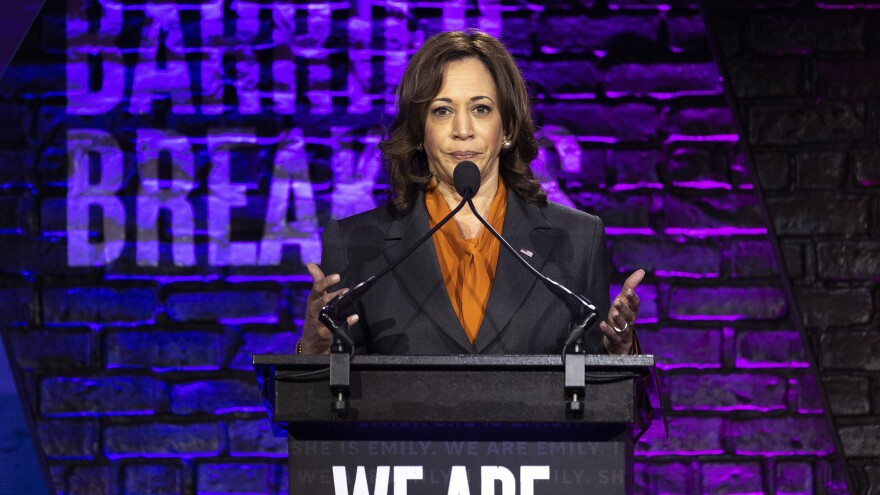
After the leaked draft of a Supreme Court decision to overturn Roe v. Wade hit the internet this week, top Democrats including President Biden and Vice President Harris have made an array of additional rights, like same-sex marriage and contraception, a central part of their messages.
Harris invoked those additional rights in a speech to pro-abortion rights group EMILY's List this week, warning that many more people than those who seek abortion access could be affected.
"If the court overturns Roe v. Wade it will be a direct assault on freedom — on the fundamental right of self-determination to which all Americans are entitled," she said.
President Biden has similarly centered an array of rights, trying to draw a sharp contrast with the GOP in the process.
"What are the next things that are gonna be attacked? Because this MAGA crowd is really the most extreme political organization that has existed in American history," Biden said this week.
There is indeed a legal connection between abortion and many other rights. But Democrats are also hoping that this message will boost them and hurt Republicans in a year when the president's party is expected to fare poorly in the midterms.
The legal connection between abortion many other rights
The idea in Roe is that abortion is an unenumerated right — that is, one that the Constitution protects, even if it doesn't explicitly say that there is a right to an abortion. And the Supreme Court has also found that abortion is protected by the 14th Amendment, which the court has used to protect people's right to privacy.
This is where Alito's argument against abortion rights comes in. The court has found in the past that unenumerated rights must be "deeply rooted in this Nation's history and tradition."
Alito's logic is that when the 14th Amendment was passed, in 1868, American law didn't recognize abortion as a fundamental right. And therefore, abortion isn't "deeply rooted in this Nation's history" and is not protected by that amendment.
That logic could easily carry over to a lot of other rights, says Mary Ziegler, a visiting professor at Harvard Law School.
"At the time the relevant part of the Constitution was written, same-sex couples could not marry. Interracial couples certainly couldn't marry. Birth control was being criminalized," she said. "And so the logic is, if that's how we determine where our constitutional rights begin and end, there's no reason that would stop with abortion."
Alito does also say that Roe is separate from these other rights because it's specifically about "fetal life." However, that doesn't mean the court couldn't change its mind in the future.
How this plays out politically
Activists have criticized Biden heavily for not talking about abortion more, or even using the word "abortion" — the group We Testify has maintained a website on the topic: didbidensayabortionyet.org. (Biden did use the word abortion this week for the first time in his presidency, according to the group.)
So when Biden and other top Democrats group abortion with other rights, it might read as reluctance or changing the subject.
But We Testify's founder, Renee Bracey Sherman, explained that connecting abortion to other rights is also about making voters see abortion as a fundamental part of a landscape of rights that are all connected to each other.
"A lot of people think, 'I might never need an abortion.' And a lot of people think about all issues like, 'Oh, well, I'm not trans.' 'I'm not Black; why does police brutality matter to me?'" she said. "But I think what people don't realize is how much something like Roe v. Wade is the bedrock of so many other things legally."
Educating people about the legal connection between these rights is important, she says, as is the basic fact of voters' self-interest.
How this plays out with voters
People's opinions on abortion are complicated. A majority of Americans believe abortion should be legal in some or all circumstances. But a plurality are in that "some" category — they think there should be some restrictions.
Relatedly, a lot of Americans also just don't feel very emotional about the topic of abortion, says Tresa Undem, a pollster who specializes in abortion and gender issues.
"In every news article [about abortion] you look at, there's a picture of protesters. That is not representative," she said. "It's like we're constantly being reinforced that this is like this cultural divide — [that it's an] angry, yelling, emotional, complex issue. And I just don't see that when I do the research."
However, people who don't pay a lot of attention to abortion might become activated if Roe is overturned.
"That is going to break through to people," she said. "They don't have to read a political article. They're going to hear about it. They're going to be upset about it. They're going to be surprised by it. Maybe not shocked, but surprised."
The idea is that people will hear that a right they've taken for granted for nearly 50 years could be taken away, and then they'll be angry.
And people do notice when something is taken away. One recent example is the fact that Obamacare grew more popular when it came under threat by congressional Republicans.
That said, this is all conjecture in the hours after the leak of a seismic potential opinion. No one knows how any of this will play out politically, especially when voters have other big concerns, like inflation.
Furthermore, even if the issue of abortion boosts Democrats in November, that doesn't mean they will be able to muster the votes to pass legislation codifying Roe — something the party's slim Senate majority is finding out right now.
To be clear, however, if Roe is overturned, there are much more immediate consequences than the midterms. Greater abortion restrictions in many states would start immediately, well before November.







